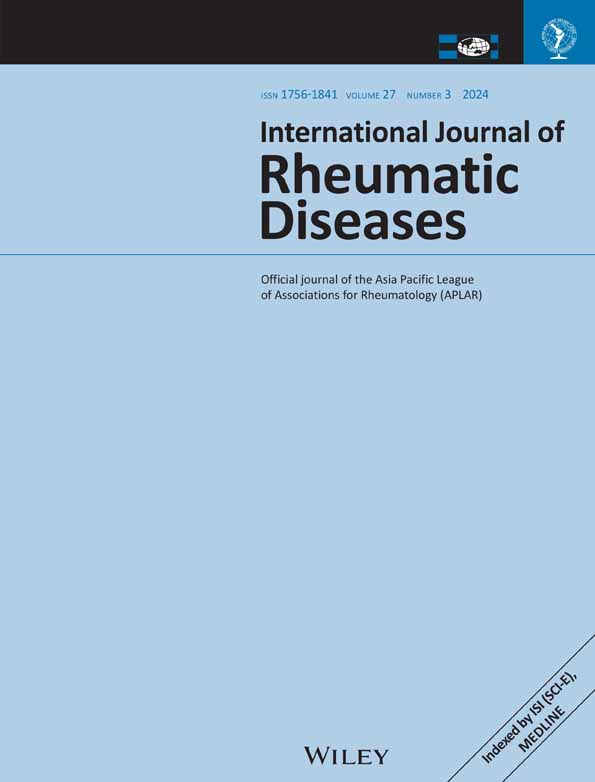Association of large joint involvement at the start of biological disease-modifying antirheumatic drugs and Janus kinase inhibitors with disease activity and drug retention in patients with rheumatoid arthritis: The ANSWER cohort study
Abstract
Aim
To investigate the association of large joint involvement (LJI) with disease activity and drug retention in patients with rheumatoid arthritis (RA) who started receiving a biological disease-modifying antirheumatic drug or Janus kinase inhibitor.
Methods
Patients with RA from a Japanese multicenter observational registry were enrolled. Our definition of large joints included the shoulder, elbow, hip, knee, and ankle joints. Linear mixed-effects models were used to examine changes in the clinical disease activity index (CDAI) score at Week 24 as the primary outcome, and drug retention rates were compared between patients with and without LJI using Cox proportional hazards models. We examined the potential effect modifications of changes in the CDAI by baseline characteristics.
Results
Overall, 2507 treatment courses from 1721 patients were included (LJI, 1744; no LJI, 763). Although LJI was associated with significantly higher changes in CDAI from baseline at Week 24 (difference in change in CDAI: −5.84 [−6.65 to −5.03], p < .001), CDAI was significantly higher in patients with LJI over time. Retention rates were similar in both groups. The association of LJI with changes in disease activity was more prominent in patients with a short disease duration, negative anti-citrullinated peptide antibodies, and interleukin-6 receptor inhibitor (IL-6Ri) use.
Conclusion
Although LJI was associated with a greater reduction in disease activity from baseline, higher disease activity at baseline was not offset over time in patients with LJI, demonstrating that LJI is an unfavorable predictor. An early treat-to-target strategy using an IL-6Ri may be beneficial for patients with LJI.
CONFLICT OF INTEREST STATEMENT
AO received research grants and/or speaker fees from Pfizer Inc., Bristol Myers Squibb, Advantest, Asahi Kasei Pharma Corp., Chugai Pharmaceutical Co. Ltd., Eli Lilly Japan K. K., Ono Pharmaceutical Co., UCB Japan Co., Mitsubishi Tanabe Pharma Co., Eisai Co. Ltd., AbbVie Inc., Takeda Pharmaceutical Co. Ltd., and Daiichi Sankyo Co. Ltd. The Department of Advanced Medicine for Rheumatic Diseases is supported by Nagahama City, Shiga, Japan; Toyooka City, Hyogo, Japan; and two pharmaceutical companies (AYUMI Pharmaceutical Co. and Asahi Kasei Pharma Corp.). The above-mentioned pharmaceutical companies were not involved in the study design, manuscript writing, or manuscript submission and will not be involved in data collection and analysis. KN has received speaker fees from Pfizer Inc., Asahi Kasei Pharma Corp., Chugai Pharmaceutical Co. Ltd., Eli Lilly Japan K. K., Ono Pharmaceutical Co., UCB Japan Co., Mitsubishi Tanabe Pharma Co., Eisai Co. Ltd., AbbVie Inc., Janssen Pharmaceutical K.K., Taisho Pharmaceutical Co., Ltd, and Viatris Inc.KM received speaker and/or consulting fees from Eisai Co. Ltd., Chugai Pharmaceutical Co. Ltd., Pfizer Inc., Bristol-Myers Squibb, Mitsubishi Tanabe Pharma Corporation, UCB Japan Co. Ltd., Daiichi Sankyo Co. Ltd., and Astellas Pharma Inc. HO received research grants and/or speaker fees from AbbVie, Asahi Kasei, Astellas Pharma Inc., Eisai Co., Ltd., Janssen Pharmaceutical KK, Mitsubishi Tanabe Pharma Corporation, and Daiichi Sankyo Co., Ltd. YM received speaker fees from Eli Lilly Japan KK, Chugai Pharmaceutical Co. Ltd., Pfizer Inc., Bristol Myers Squibb, and Mitsubishi Tanabe Pharma Corporation. KE is affiliated with the Department of Musculoskeletal Regenerative Medicine, Osaka University, Graduate School of Medicine, which is supported by Taisho, and has received research grants and/or speaker fees from AbbVie, Amgen, Asahi Kasei, Astellas, AYUMI, Bristol-Myers Squibb, Chugai, Daiichi Sankyo, Eisai, Eli Lilly, Janssen, Mitsubishi Tanabe, Ono Pharmaceutical, Pfizer, Sanofi, Taisho Teijin Pharma, and UCB Japan. YS received speaker fees from Bristol-Myers Squibb, Chugai, Janssen, Eisai, and AbbVie. RH received speaker fees from AbbVie, Eli Lilly, Eisai, and Asahi Kasei. YH has received speaker fees from Bristol-Myers Squibb, Astellas Pharma Inc, Asahi-Kasei, and UCB Japan Co. Ltd.MH received research grants and/or speaker fee from Abbvie, Asahi Kasei, Astellas, Brystol Meyers, Chugai, EA Pharma, Eisai, Daiichi Sankyo, Eli Lilly, Novartis Pharma, Taisho Toyama, Tanabe Mitsubishi.TO received research grants and speaker fees from Asahi Kasei, Eisai, Mitsubishi Tanabe, AbbVie, Chugai, Eli Lilly, Janssen, and Novartis Pharma. SJ has received speaking fees from AbbVie, Asahi Kasei Pharma., Bristol-Myers Squibb., Chugai, Ltd., Eisai, Eli Lilly, Janssen, and Mitsubishi Tanabe, and Ono.HY received speaker fees from AbbVie, Asahi Kasei Pharma, Astellas Chugai, Eisai Gilead Sciences, and Taiho Pharmaceuticals. YU has received speaker fees from AbbVie, Asahi Kasei Pharma, Astellas, Bristol Meyers Squibb, Chugai, Eisai, Eli Lilly, Gilead Sciences, and Taiho Pharmaceutical. JS received grants and/or speaker fees from Asahi Kasei Pharma; Abbie Inc.; Chugai Pharmaceutical Co., Ltd.; Eli Lilly Japan K.K.; Pfizer Inc.; Eisai; Janssen Pharmaceutical K.K.; and Mitsubishi Tanabe Pharma. The remaining authors have no competing interests to report.
Open Research
DATA AVAILABILITY STATEMENT
The datasets generated and/or analyzed in the present study are not publicly available. Therefore, the patients did not consent to sharing raw data during data collection. All aggregated data relevant to the study are included in the article or uploaded as supplementary information.




